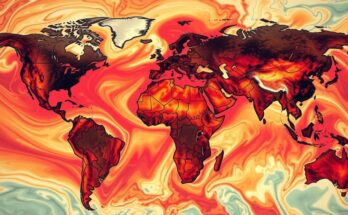The International Court of Justice held hearings in December to determine state obligations regarding climate change, prompted by a UNGA request. The final responses to judges’ questions were submitted by 64 participants, highlighting the global call for accountability. The advisory opinion from the ICJ could inform future climate-related legal frameworks and state responsibilities.
In December, the International Court of Justice (ICJ) conducted oral hearings regarding an Advisory Opinion on the obligations of states concerning climate change. At the request of the United Nations General Assembly (UNGA), the ICJ will assess the financial responsibilities of countries for their roles in climate change and the necessary actions they are required to undertake. The hearings attracted numerous participants, and responses to judges’ inquiries were submitted by the December 20 deadline.
Established in 1945 under the UN Charter, the ICJ, often referred to as the World Court, addresses legal disputes among nations and provides a neutral forum for resolution. Located in The Hague, Netherlands, its jurisdiction is separate from that of the International Criminal Court. The ICJ features 15 judges, elected to serve nine-year terms, representing various countries. Currently presided over by Judge Nawaf Salam of Lebanon, the Court incorporates judges from diverse nations, including the United States, China, and India.
In a landmark request made on March 29, 2023, the UNGA asked the ICJ to provide an advisory opinion on states’ legal obligations to prevent climate change. Although this opinion will not have binding authority, it is anticipated to influence future climate litigations and legislative frameworks. Specifically, the UNGA posed two critical questions about the obligations of states under international law and the legal consequences for those whose actions harm the climate system, particularly affecting vulnerable populations and nations.
From December 2 to December 13, the hearings unfolded with Vanuatu leading the opening arguments. Over one hundred countries participated, presenting structured oral statements backed by citations, with written transcripts made available on the ICJ’s website. The discussions primarily invoked the UN Convention on Climate Change and the Paris Agreement, with larger nations advocating for a treaty-centric approach while developing countries argued for recognition of human rights violations due to climate impacts.
Judge Salam laid the groundwork for the process, allowing written questions from judges at the conclusion of the sessions. Judges posed various inquiries covering state obligations, the binding nature of the Paris Agreement, and rights to a healthy environment. Responses were furnished by various nations and organizations, reflecting a broad spectrum of viewpoints regarding state accountability in climate governance.
Responses came from a wide array of participants, including the African Union, the European Union, and numerous countries like India, Canada, and Brazil. This diverse participation illustrates the global dimensions and stakes associated with climate change litigation.
The recent hearings by the International Court of Justice focus on the obligations of nations under international law concerning climate change. This is particularly relevant as countries grapple with the impact of climate change on vulnerable populations and environments. With increasing pressure from the global community to address climate issues, the ICJ’s advisory opinion is positioned to guide future international climate action and legal interpretations. As nations strive to balance development and environmental stewardship, clarity on legal obligations is critical.
The ICJ hearings represent a significant step toward understanding the legal responsibilities of nations in mitigating climate change impacts. As the Court deliberates on these issues, the advisory opinion is poised to influence future climate policies and international law interpretations significantly. The extensive participation from diverse nations highlights the urgent need for collaborative mechanisms to address the global climate crisis, particularly for vulnerable populations and ecosystems.
Original Source: www.forbes.com




